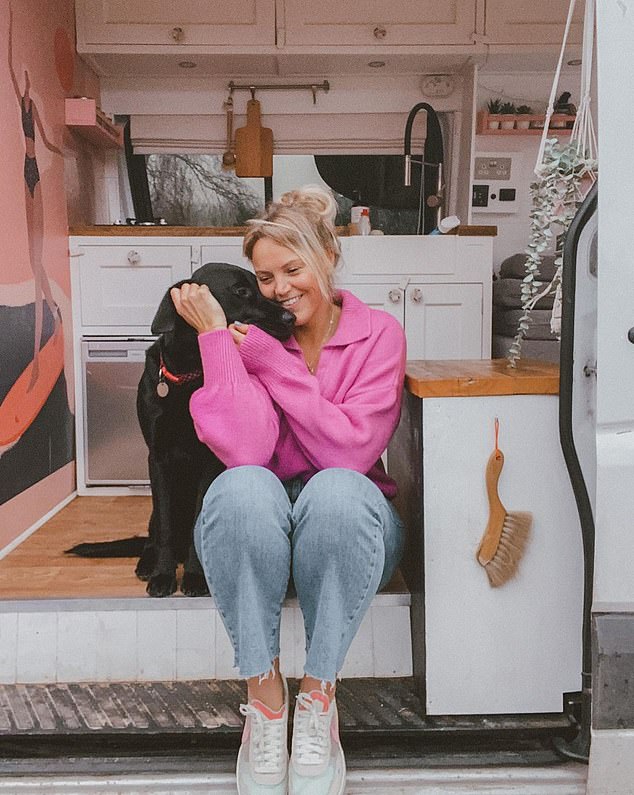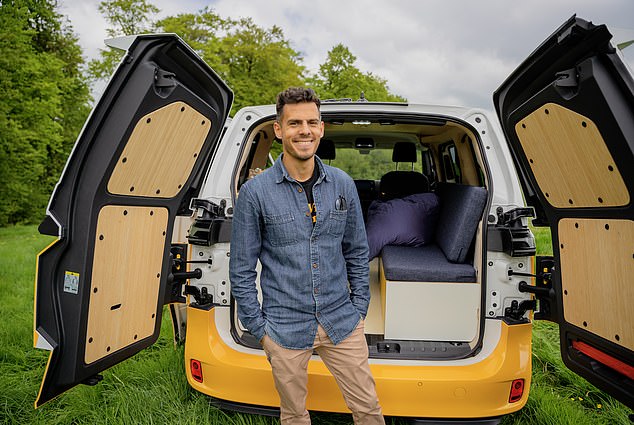We lived in RVs to reduce our costs and save on a house deposit
Emma Orlando was determined to get on the property ladder but realized she would never save enough for a deposit while spending around £1,000 a month on rent. So three years ago she took a dramatic step.
“I moved to a camper to cut costs,” says the 28-year-old.
‘It took just over three years of living and working in it to save a £50,000 deposit for the house I have now bought in Newquay in Cornwall.’
Emma decorated her van with the help of a friend and watched videos online on how to do it. She also continued her job as a freelance marketer using WiFi in her van.
Vanlife: Shots of RV living have become a social media staple in recent years, but for some aspiring first-time buyers, living in a van is a way to make a down payment
‘I stayed on a campsite in Cornwall with a beautiful view of the ocean which cost £300 a month,’
Once the van was completed, the costs for Emma were minimal. She said the cost of running the van was no different to a car, including road tax and filling up with diesel.
The dream of owning a home is being pushed further and further out of the reach of first-time buyers because rising mortgage rates and wages cannot keep pace with rising house prices.
According to estate agent Zoopla, the average deposit for a first-time buyer is now £34,500 – a figure few can achieve without help from their family. As a result, aspiring first-time buyers are being forced to adapt, with 700,000 more adults living with their parents than a decade ago.
And a small number are choosing to live in an RV to boost their savings. The rise of remote working makes it an increasingly popular option, as many employees are no longer tied to where they work. Many like Emma choose scenic destinations.
The National Caravan Council, a UK trade body for campervan owners, says campervan sales have risen steadily since 2013, peaking during Covid lockdowns.
Spokeswoman Rebecca Hutton said: ‘Due to rising rental prices, a lack of affordable housing and the cost of living, there are reports that some people are choosing to purchase a motorhome, caravan or motorhome as an alternative to more traditional living arrangements.’

Amy Nicholson says living in a van has cut her expenses
Amy Nicholson got into a van two years ago after living with her parents in Kent. The 36-year-old said: ‘I lived with them for much of the pandemic and my mental health wasn’t great. So I decided to sell my car – my only asset – and buy a van to have some freedom.”
With the help of her parents, Amy converted an empty van and even installed solar panels for electricity, all under the watchful eye of her mother’s dog, Indie. ‘Before I moved in with my parents, I was spending £1,200 a month on rent and bills on a flat in Kent,’ she says. “So I’m saving a lot.”
With the solar panels, Amy only has to pay for gas for her cooker – around £40 a year – and camping accommodations. Thanks to the lower costs, she has saved enough to buy and renovate a house in Newquay – with some help from her parents.

Equipped: Lewis Nyman and one of his vans that he rents out for business – he lived in another one himself to save money
Lewis Nyman has similarly managed to grow his savings. He had paid £750 a month for a house share, and then more than £1,000 a month to rent a flat in Brighton.
But thanks to living in a camper van for the past few years, he has built up £25,000 in savings.
Lewis, 36, now runs a fleet of electric campervan rentals in Brighton as a business. Like most people who have embraced this lifestyle, he finds it ideal in the summer – and cool in the winter.
He says: ‘One year it was minus three in the van and it was so cold that the gas liquefied. I couldn’t even light the stove.’
He can work remotely, so he plans to go to Spain or Portugal for the colder months.
Robert and Mariona Bolohan, 29 and 27, hopped into a van more than a year ago after struggling to save for a down payment on a house.
However, they find they like the lifestyle and manage to run three web-based branding and translation businesses from the van, while saving up to £2,000 a month.
So they are in no hurry to move. “If we sell the van we will have a £65,000 deposit to invest in a property in our native Catalonia, Spain, to renovate,” says Robert.
Some links in this article may be affiliate links. If you click on it, we may earn a small commission. That helps us fund This Is Money and keep it free to use. We do not write articles to promote products. We do not allow a commercial relationship to compromise our editorial independence.
